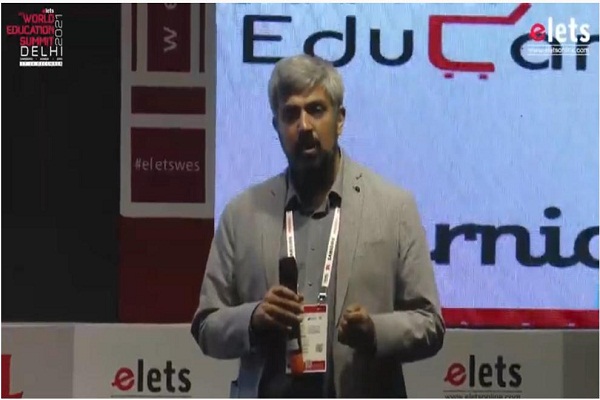
Climate change and sustainability are two issues that need strong attention and focus. Abhishek Jani, CEO of Fair Trade India talks to Digital Learning about how Fair Trade India works towards creating awareness on these issues.
Q – Tell us more about Fairtrade India ?
A – Fairtrade India is a not-for-profit initiative which is building a sustainable and ethical platform for consumers, businesses, and farmer organizations in India. Part of the Fairtrade International network, Fairtrade India enables small-holder farmer organizations to commit to better social, economic, and environmentally sustainable practices. Fairtrade India then facilitates more remunerative and fairer market linkages for these farmer organizations across varied categories, including Food and Beverages, FMCG products, and Fashion. Fairtrade India also spreads awareness about sustainability, UN SDGs, and Fairtrade amongst citizens, institutions, businesses, and other stakeholders. By conducting annual campaigns, programmes with schools, universities and workplaces, and outreach through social and traditional media, Fairtrade India hopes to make citizens more aware about and engaged with responsible and sustainable consumption and how through their everyday choices they can make a difference to the planet and the people.
Q – How are you involving schools in creating awareness about sustainability and climate change?
A – As the world comes to terms with the various global crisis – the pandemic, climate change, growing inequality, resource scarcity- there is a growing realisation that we need to prepare for the future with a different approach today. One of the most powerful things we can do is to have education institutions equip and empower young people to work collaboratively towards sustainable development in their communities. The Fairtrade India Schools Programme (FISP) is such a platform for collaboration with schools to raise awareness and engagement of institutions and students with Sustainability and SDGs.
The FISP provides a three-stage easy and accessible framework through which schools can increase awareness and engagement in a step-by-step manner. The first stage FairAware takes the learners from sensitisation to awareness about the global challenges and the Fairtrade approach. In the second stage FairActive, we focus on building the learner’s skills to participate in and drive the sustainability movement. The final stage, Fair Achiever engages learners to adopt sustainability practices in their lives and communities. Currently, we are working with over 14000 students in some of the leading institutions across India as a part of this programme.
Q – When one talks about climate change and sustainability, how can the schools introduce this as a part of their curriculum ?
A – With the introduction of the NEP across curricular, schools in India are looking to incorporate additional dimensions around- United Nations Sustainable Development Goals (SDGs) by building skills and capabilities of students in a more holistic manner. The Fairtrade India Schools Programme (FISP) provides teachers with a range of lesson plans, activities and learning material which can be integrated easily into curricular learning across subjects, ranging from- Geography and learning about how and where different food come from, to Mathematics and Economics in learning about trade and fair negotiations to Languages where students can undertake persuasive writing to support brands in adopting more sustainable practices. It is in this manner that the FISP connects in school learning with the everyday experiences in the student’s lives and how that can be made more responsible and sustainable. FISP also provides learning materials and creatives for extra-curricular engagement and also encourages students to apply their learning in their lives and communities.
Q – When talking about ethical consumer choices, what is the kind of product you are talking to the consumer about ?
A – Fairtrade works extensively in the agriculturally based industries. Agriculture as a sector contributes approximately 12% to global Greenhouse Gas emissions which is causing climate change. Unsustainable agricultural practices lead to introduction of toxic chemicals in our food, excessive usage of water, degradation of soil and exploitation of vulnerable communities. Furthermore with 80% of the world’s food grown by small holder farmers we often see the farmers themselves living in poverty and hunger. Fairtrade works in the agricultural sector to promote more sustainability and create more ethical consumer choices in Food & Beverage, FMCG, Fashion and even Cosmetics sector where agricultural raw materials are used extensively. In India we are working with businesses who have pioneered Fairtrade Teas, Coffee, Chikkis, Chocolates, Vegetables, Fashion, Cosmetics and even Footballs.
Q – What have been your best practices in terms of working with the farmers, especially cotton farmers?
A – Fairtrade has been working with Cotton farmers in India for over 15 years. Cotton as a crop can be very resource intensive whether it be application of chemical pesticides and weedicides or use of water for cultivation. The sector has also been marred with social issues such as child labour and other exploitative practices. Fairtrade works with smallholder cotton farmers and builds their capacity to follow more sustainable practices. Farmers get organised into collectives and build community systems to follow better agricultural practices. They reduce the chemical and water usage, do not use Genetically Modified Seeds, prohibit the use of child labour and other such non-exploitative practices as per the Fairtrade Standard. Many of the Fairtrade Cotton farmers are also following Organic practices. Furthermore, the Fairtrade Premium earned by the Cotton farmers has been used for various community development projects including rainwater harvesting, creating storage facilities, training of farmers to be more productive and efficient and also providing scholarships to the children of the farming community. So every time consumers choose sustainable consumption choices through Fairtrade Labelled products they are contributing to this virtuous cycle of change.






















